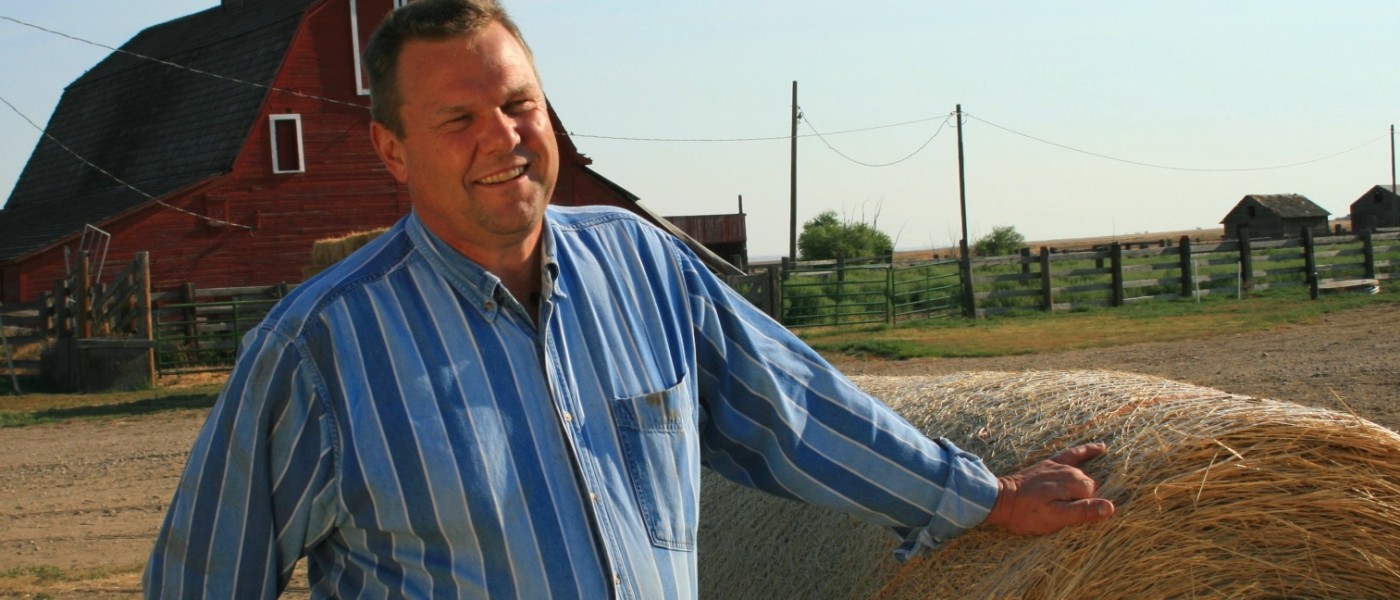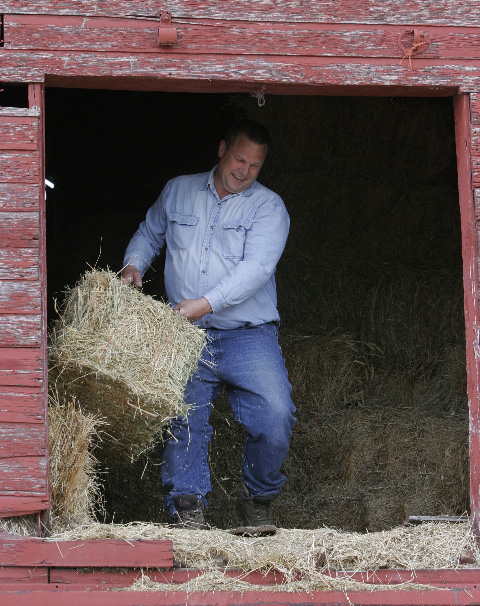The Tester Family Farm has stood on 1,800 acres of land in beautiful wheat country for a little more than 100 years. A 100% organic farm raising barley, red lentils, kamut, alfalfa, hay, and safflower also raised the very man who both runs the operation and a little piece of our country, today. United States Senator Jon Tester is a man juggling two different jobs: one as a family farmer back home in Big Sandy, Montana, and one representing the people of his home state in the US Senate. Armed with the values, ethics, and heart of a family farmer (and some of his own freshly cut meat from his Big Sandy butcher shop), Senator Jon Tester is proud to always bring a little agriculture to Capitol Hill.
The farm, started by Tester’s grandparents back in 1912 and passed down to his parents in 1943, has always succeeded under a strong, equal partnership between husband and wife. The youngest of three boys, Tester, even as an eight year old, was eager to be the one to follow in his family’s footsteps. “I wanted to keep my hands in the dirt… It’s just in my blood,” Tester explained. Upon his parents’ retirement and his graduation from the University of Great Falls, Tester and his wife Sharla moved back to Big Sandy and took over the farm, thus beginning the third and current generation of Tester family ownership. Tester returned to the farm with a Bachelor of Science in Music but embraced his farming career completely and wholeheartedly: “I felt very, very blessed to be able to do something I’ve wanted to do my whole life. There have been times when farming hasn’t been particularly enjoyable but those times have been few and far between.”
Senator Tester, being a family farmer and an active member of the United States Senate, works hard to keep both schedules maintained and efficient. During the week he’s in Washington, D.C., attending Senate floor sessions, press conferences, and working on legislation. The weekday grind is followed by an equally full weekend of farming. On Saturday and Sunday the Testers are up around 5 or 6 in the morning to catch up over breakfast and prepare for a long day of cultivating, working on equipment, and whatever else needs to be done.
Balancing his work in the Senate and on the farm is a challenge, of course. “There’s been many a Sunday night that I’ve gotten on the tractor at 6 Sunday morning and just run it right straight through until I jump off and basically go to the plane and fly on back,” Tester recalls, “But it’s one of those deals where you just have to suck it up and keep going.”
But not even Senator Tester can do it alone. Just as his father and grandfather did before him, Tester considered the duties of running the farm an equal partnership: “Sharla, my wife, can do everything I can do on the farm. She can run tractor, she can run truck, she can run combine… That’s very much a help because often times when I’m in the Senate on the weekend or things are a little too wet to till, I’ll get everything ready to go and she’ll go out and do it when things dry up a little bit, so that’s a big help. It really is a partnership.”
With a knack for farming already under his belt before grade school, young Tester acquired interests in subjects like mechanics and music (and politics, but more on that later…) Each interest had its pros and cons: the diesel route would be a nice tool for taking over the farm, but Tester’s folks reminded him that the farm may not always be there. A talent for trumpet and a passion for education certainly diversified his set of skills, but would of course require more training away from the farm. Ultimately, advice from his parents and a music teacher led Tester to pursue a degree in music education at the University of Great Falls. The advice from his folks, he recalled, has stuck with him. “They said, ‘We have diversified our income on the farm, we’ve diversified farming practices.’ I just really think that if you get hooked into a monoculture, one-way-of-doing things, ‘this is the way it is,’ it puts you at much higher risk of failure. That’s why I went into music – I had a certain skill level, and the folks said ‘diversify your options, it will open up for more things in life.'”
“There’s been many a Sunday night that I’ve gotten on the tractor at 6 Sunday morning and just run it right straight through until I jump off and basically go to the plane and fly on back, but it’s one of those deals where you just have to suck it up and keep going.”
Tester’s job teaching music at F.E. Miley Elementary School was a logical stepping-stone for a seat on the local school board. He also served on the local conservation committee, the farm service agency, and organic certification board. And with the 1998 state senate election fast approaching, Tester’s neighbor announced he wouldn’t be running for re-election. “That was my opportunity,” he says. “The timing wasn’t exactly optimal, but it was an opportunity that may not be there for another 2, 4, 6, 8 years.” He worked hard, he made his own luck, and he won. A successful career with the state legislature led Tester to win a seat in the US Senate in 2006 and win re-election in 2012.
“I wasn’t supposed to win, but I did. It’s all based on an ethic that I learned on the farm, and that ethic is hard work. It’s putting in that extra hour that night before the rain comes. It’s the same thing in politics. If you’re knocking on doors, you do that next block. You want to quit, you’re tired, you want to go home, but you just do one more block. And same thing if you’re running for US Senate: do that next rally, meet with that next senior support or business group, you just keep working. It’s a value that the farm has taught me, that my parents taught me: if you work hard, you’ll make your own luck.”
Tester admits that running the farm and serving in the Senate at the same time is hard work, but it’s something that he believes keeps him connected with the soil, the business, and the people of the state he’s proud to represent. Not to mention, a long week in D.C. can sure make a man miss the rural nature of his starry Montana home base. “When I lay down in bed at night in D.C., I look out the window and it’s fairly bright, because of the street lights. If you open up your ears, you hear sirens going down the street with certain regularity. Now contrast that with the farm: I look out the window, the only thing I can see that’s emitting light is stars. That’s it.”
Standing his ground as the Senate’s only active farmer, Tester is always prepared to fight for the future of family farmers and good farming practices. He encourages consumers to make connections with their growers and always know their food: “You know your farmers, you know your food. Milk doesn’t come from a carton; peas don’t come from a can on a grocery store shelf. If you know your farmer, it allows that farmer to understand that what he or she’s doing is important. Often times, that importance is lost, especially in a system where multinational food corporations control a huge portion of the food supply.” Tester understands that food is not to be treated as a commodity — he’s not raising commodities, he’s raising food. And he’s not only raising it for the people of Montana, but he’s working hard in the Senate to make sure that people like himself, his family, and all family farmers have a place in our food system.






